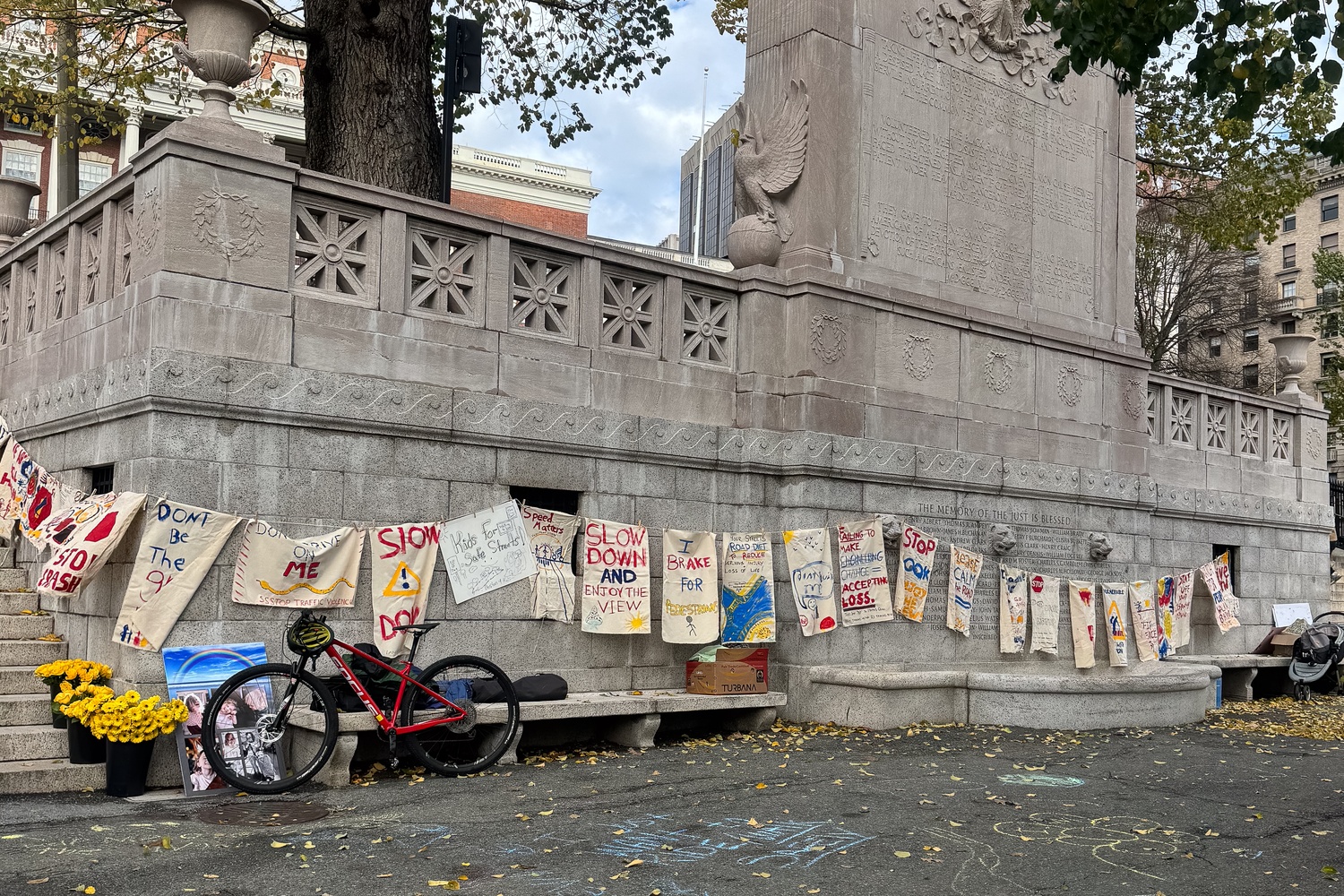
News
Summers Will Not Finish Semester of Teaching as Harvard Investigates Epstein Ties

News
Harvard College Students Report Favoring Divestment from Israel in HUA Survey

News
‘He Should Resign’: Harvard Undergrads Take Hard Line Against Summers Over Epstein Scandal

News
Harvard To Launch New Investigation Into Epstein’s Ties to Summers, Other University Affiliates

News
Harvard Students To Vote on Divestment From Israel in Inaugural HUA Election Survey
‘I Hate That This Day Has To Exist’: Hundreds Rally for Bike Safety

BOSTON — More than 250 people crowded the steps of the State House on Boston Common on Sunday for the “Ride and Walk for Your Life” rally, calling for stronger road-safety laws amid a rise in cyclist deaths across Cambridge and Boston.
Now in its second year, the rally brought together families, cyclists, and advocates on the World Day of Remembrance for Road Traffic Victims. Organized by seven bicycle-safety groups from Cambridge and Boston, it paired a solemn gathering with a coordinated push for legislative change.
The renewed urgency follows a string of fatal crashes. Three cyclists have died on Cambridge roads in the past two years: Minh-Thi Nguyen, an MIT graduate student; John H. Corcoran ’84; and a woman struck at the intersection of two busy roads in Harvard Square.
Those deaths have made bike safety a pressing issue for Cantabridgians and shaped local politics as well. Cambridge Bicycle Safety — one of the city’s three super PACs — endorsed twelve candidates for the City Council, seven of whom won election.
Jack B. Corcoran ’25, an organizer with CBS who encouraged Harvard students to become engaged in Cambridge politics after the death of his father, cited those victories as proof that advocacy can reshape city priorities.
“You couldn’t have won pro bike seats in both the Cambridge and Boston elections without the work and support of the city’s voters,” Corcoran said. “What we’re doing is valuable.”
Before converging on Boston Common, participants completed a roughly six-mile ride through Boston and Cambridge, tracing roads where fatal crashes have occured. Volunteers handed out pamphlets which contained legislation they urged attendees to pressure lawmakers to support.
Massachusetts Senate President Pro Tempore William N. Brownsberger pointed to the clear results of a “huge decline in road enforcement.”
“Very few people drive the speed limit, and all too many don't even stop at red lights,” he said, arguing that establishing enforcement is now essential.
Two bills featured in the pamphlets — Senate Bill 2344 and House Bill 3754 — would authorize road safety cameras to issue violation notices without requiring in-person stops. A third, Senate Bill 2343, would “improve safety equipment on trucks” by requiring additional mirrors and side guards to reduce blind spots
Speakers stressed that the political gains of recent elections are only a beginning. Tiffany B. Cogell — the interim executive director of the Boston Cyclist Union — urged attendees to keep the ante up on legislators.
“There is more work to do, people are still losing their lives, families are still grieving,” she said.
“We mourn today, but we’ve also got to mobilize tomorrow,” Cogell added. “Make sure they hear you. Make sure they cannot ignore you.”
The calls for stronger road-safety laws come as Cambridge braces for a multi-year economic slowdown that could force cuts to community programs. City leaders have said they remain committed to completing the Cycling Safety Ordinance — the city’s 25 mile bike network — but have been forced to search for more cost-effective ways to meet its requirements.
Several cyclists said they rode to Boston Common to shed light on the human costs of unsafe streets.
Miriam S. Hils, who previously lived in Europe, said she hopes Boston will emulate cities abroad that are built around walking and cycling.
“I want to find out about what local planners and politicians are doing to improve the situation,” she said.
Veteran cyclist Martha Merson,who has ridden in Boston since 1992, said “many days my life flashes before my eyes.”
“We need political leaders who are willing to take that kind of action and create legislation that ensures safer streets for walkers and cyclists,” she added.
The rally’s pre-planned remarks concluded with Reverend Laura Everett, the leader of the Massachusetts Council of Churches, who said she was tired of officiating ceremonies memorializing those killed in traffic crashes
“I don’t want to do any more ghost bike ceremonies,” she said. “I’m tired of wondering who we will bury next.”
She ended on a note of resolve, envisioning “a day when there’s zero traffic fatalities for you,” before inviting community members who had been impacted by or experienced traffic violence to speak.
Twelve community members stepped forward to share their stories.
—Staff writer Dionise Guerra-Carrillo can be reached at dionise.guerracarrillo@thecrimson.com.
Want to keep up with breaking news? Subscribe to our email newsletter.
